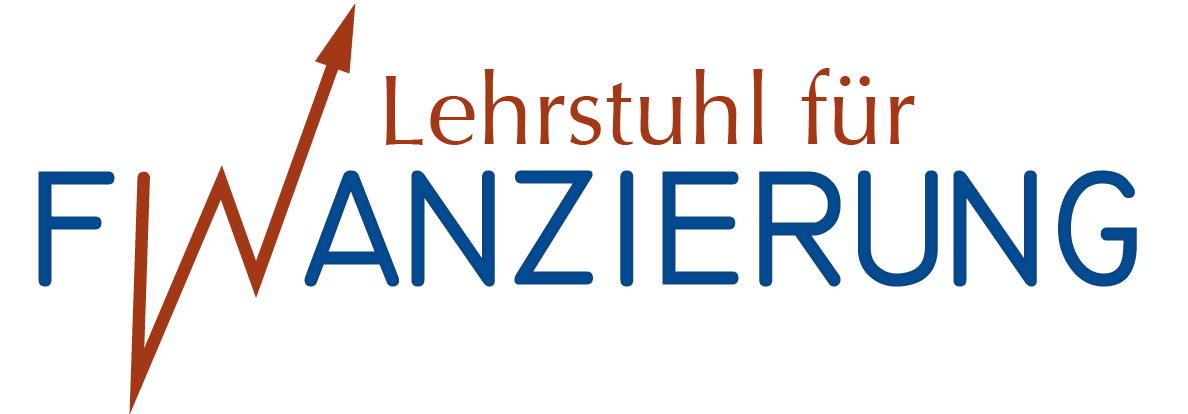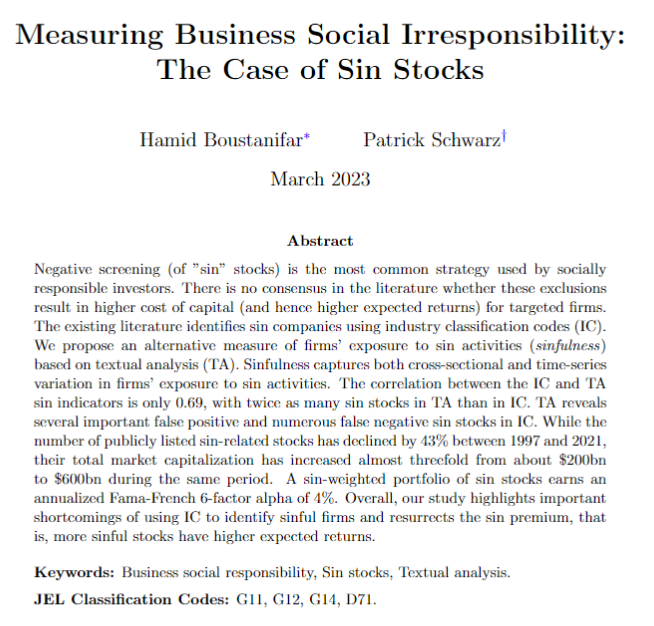Team

Ehem. Wissenschaftlicher Mitarbeiter
Assistant Professor Dr. Patrick Schwarz
- E-Mail:
- patrick.schwarz (at) uliege.be
- Homepage:
- 1
- Social Media:
- @datrickf
- Autorenprofile:
- ORCID
- Google Scholar
- SSRN
Lebenslauf:
Praktische Erfahrungen:
- 09/2024 - heute: Juniorprofessor (tenure-track) für Finance/Accounting HEC Liège - Management School Liège Université
- 2018 - 2024: Wissenschaftlicher Mitarbeiter am Lehrstuhl für Finanzierung an der Universität Duisburg-Essen, Campus Essen
- 2019 - 2020: Dozent für Finance an der Hochschule für Ökonomie und Management (FOM)
- 2017 - 2018: Wissenschaftliche Hilfskraft am Lehrstuhl für Betriebswirtschaftslehre, insbesondere Entrepreneurship und Finanzierung an der Heinrich-Heine Universität Düsseldorf
- 2014 - 2015: Professional bei Deloitte & Touche Wirtschaftsprüfungsgesellschaft GmbH, Tax & Legal – Private Company Services
Ausbildung:
- 2018 - 2024: Promotionsstudium (Dr. rer. pol.) am Lehrstuhl für Finanzierung an der Universität Duisburg-Essen, Campus Essen
- 2015 - 2018: Studium der Betriebswirtschaftslehre (M.Sc.) an der Heinrich-Heine Universität Düsseldorf
- 2011 - 2014: Studium der Betriebswirtschaftslehre (B.Sc.) an der Heinrich-Heine Universität Düsseldorf
Forschungsgebiete:
- Empirische Kapitalmarktforschung, Asset Management, Asset Pricing, Anomalien und Markteffizienz
Publikationen:
- Heckmann, Jens; Jacobs, Heiko; Schwarz, Patrick: Synthesizing Information-driven Insider Trade Signals, 2023. VolltextBIB DownloadKurzfassungDetails
Abstract
We propose a simple approach to synthesize presumably information-driven insider trading signals for the cross-section of stocks. We find that the resulting composite strategy can predict returns, predominantly in equal-weighted portfolios, in our global sample. The results indicate that the benefits of our composite strategy reflect a short-term informational advantage of insiders. Finally, cross-country analysis reveals that varying insider trading restrictions between countries have limited explanatory power for the benefits of the composite strategy.
- Boustanifar, Hamid; Schwarz, Patrick: Measuring Business Social Irresponsibility: The Case of Sin Stocks, 2023. VolltextBIB DownloadKurzfassungDetails
Abstract
Negative screening (of "sin" stocks) is the most common strategy used by socially responsible investors. There is no consensus in the literature whether these exclusions result in higher cost of capital (and hence higher expected returns) for targeted firms. The existing literature identifies sin companies using industry classification codes (IC). We propose an alternative measure of firms' exposure to sin activities (sinfulness) based on textual analysis (TA). Sinfulness captures both cross-sectional and time-series variation in firms' exposure to sin activities. The correlation between the IC and TA sin indicators is only 0.69, with twice as many sin stocks in TA than in IC. TA reveals several important false positive and numerous false negative sin stocks in IC. While the number of publicly listed sin-related stocks has declined by 43% between 1997 and 2021, their total market capitalization has increased almost threefold from about $200bn to $600bn during the same period. A sin-weighted portfolio of sin stocks earns an annualized Fama-French 6-factor alpha of 4%. Overall, our study highlights important shortcomings of using IC to identify sinful firms and resurrects the sin premium, that is, more sinful stocks have higher expected returns.
- Schwarz, Patrick: On the performance of volatility-managed equity factors - international and further evidence, 2021. VolltextBIB DownloadKurzfassungDetails
Abstract
Motivated by the mixed evidence on the performance of (downside) volatility-managed equity factor portfolios in the U.S., I study the performance of nine (downside) volatility-managed equity factors before and after considering transaction costs in a set of 45 international equity markets. My results suggest that volatility management is most promising for market, value, profitability, and momentum portfolios and that the performance can be enhanced by applying downside volatility instead of total volatility (variance) as a scaling factor. Nevertheless, a marginal trader would find it difficult to profit from these strategies as only the managed market and momentum strategies are partially robust to my transaction cost estimations. Collectively, my results suggest that the persistence of abnormal returns of (downside) volatility-managed equity factors can largely be explained by the associated transaction costs. Finally, my cross-country analysis suggests that the slow trading hypothesis is partially able to explain cross-country performance differences of volatility-managed value and momentum portfolios.
Vorträge:
- Schwarz, Patrick: Measuring Business Social Irresponsibility: The Case of Sin Stocks, 21th EUROFIDAI-ESSEC Paris December Finance Meeting (PDFM), 19.12.2023, Paris, FRA. AbstractDetails
Negative screening (of "sin" stocks) is the most common strategy used by socially responsible investors. There is no consensus in the literature whether these exclusions result in higher cost of capital (and hence higher expected returns) for targeted firms. The existing literature identifies sin companies using industry classification codes (IC). We propose an alternative measure of firms' exposure to sin activities (sinfulness) based on textual analysis (TA) of their annual reports. Sinfulness captures both cross-sectional and time-series variation in firms' exposure to sin activities. The correlation between the IC and TA sin indicators is only 0.69, with twice as many sin stocks in TA than in IC. TA reveals several important false positive and numerous false negative sin stocks in IC. While the number of publicly listed sin-related stocks has declined by 43% between 1997 and 2021, their total market capitalization has increased almost threefold from about $200bn to $600bn during the same period. A sin-weighted portfolio of sin stocks earns an annualized Fama-French 6-factor alpha of 4%. Overall, our study highlights important shortcomings of using IC to identify sinful firms and resurrects the sin premium, that is, more sinful stocks have higher expected returns.
- Schwarz, Patrick: Measuring Business Social Irresponsibility: The Case of Sin Stocks, 29th Annual Meeting of the German Finance Association (DGF), 29.09.2023, Hohenheim, GER. AbstractDetails
Negative screening (of "sin" stocks) is the most common strategy used by socially responsible investors. There is no consensus in the literature whether these exclusions result in higher cost of capital (and hence higher expected returns) for targeted firms. The existing literature identifies sin companies using industry classification codes (IC). We propose an alternative measure of firms' exposure to sin activities (sinfulness) based on textual analysis (TA) of their annual reports. Sinfulness captures both cross-sectional and time-series variation in firms' exposure to sin activities. The correlation between the IC and TA sin indicators is only 0.69, with twice as many sin stocks in TA than in IC. TA reveals several important false positive and numerous false negative sin stocks in IC. While the number of publicly listed sin-related stocks has declined by 43% between 1997 and 2021, their total market capitalization has increased almost threefold from about $200bn to $600bn during the same period. A sin-weighted portfolio of sin stocks earns an annualized Fama-French 6-factor alpha of 4%. Overall, our study highlights important shortcomings of using IC to identify sinful firms and resurrects the sin premium, that is, more sinful stocks have higher expected returns.
- Schwarz, Patrick: Measuring Business Social Irresponsibility: The Case of Sin Stocks, 20th Annual Corporate Finance Days (CFD), 21.09.2023, IÉSEG, Lille, FRA. AbstractDetails
Negative screening (of "sin" stocks) is the most common strategy used by socially responsible investors. There is no consensus in the literature whether these exclusions result in higher cost of capital (and hence higher expected returns) for targeted firms. The existing literature identifies sin companies using industry classification codes (IC). We propose an alternative measure of firms' exposure to sin activities (sinfulness) based on textual analysis (TA) of their annual reports. Sinfulness captures both cross-sectional and time-series variation in firms' exposure to sin activities. The correlation between the IC and TA sin indicators is only 0.69, with twice as many sin stocks in TA than in IC. TA reveals several important false positive and numerous false negative sin stocks in IC. While the number of publicly listed sin-related stocks has declined by 43% between 1997 and 2021, their total market capitalization has increased almost threefold from about $200bn to $600bn during the same period. A sin-weighted portfolio of sin stocks earns an annualized Fama-French 6-factor alpha of 4%. Overall, our study highlights important shortcomings of using IC to identify sinful firms and resurrects the sin premium, that is, more sinful stocks have higher expected returns.
- Schwarz, Patrick: Measuring Business Social Irresponsibility: The Case of Sin Stocks, 6th Annual Conference of the Global Research Alliance on Sustainable Finance and Investment (GRASFI), 23.08.2023, Yale University, New Haven, US. AbstractDetails
Negative screening (of "sin" stocks) is the most common strategy used by socially responsible investors. There is no consensus in the literature whether these exclusions result in higher cost of capital (and hence higher expected returns) for targeted firms. The existing literature identifies sin companies using industry classification codes (IC). We propose an alternative measure of firms' exposure to sin activities (sinfulness) based on textual analysis (TA) of their annual reports. Sinfulness captures both cross-sectional and time-series variation in firms' exposure to sin activities. The correlation between the IC and TA sin indicators is only 0.69, with twice as many sin stocks in TA than in IC. TA reveals several important false positive and numerous false negative sin stocks in IC. While the number of publicly listed sin-related stocks has declined by 43% between 1997 and 2021, their total market capitalization has increased almost threefold from about $200bn to $600bn during the same period. A sin-weighted portfolio of sin stocks earns an annualized Fama-French 6-factor alpha of 4%. Overall, our study highlights important shortcomings of using IC to identify sinful firms and resurrects the sin premium, that is, more sinful stocks have higher expected returns.
Motivated by the mixed evidence on the performance of (downside) volatility-managed equity factor portfolios in the U.S., I study the performance of nine (downside) volatility-managed equity factors before and after considering transaction costs in a set of 45 international equity markets. My results suggest that volatility management is most promising for market, value, profitability and momentum portfolios and that the performance can be enhanced by applying downside volatility instead of total volatility (variance) as a scaling factor. Nevertheless, a marginal trader would find it difficult to profit from these strategies as only the managed market and momentum strategies are partially robust to my transaction cost estimations. Collectively, my results suggest that the persistence of abnormal returns of (downside) volatility-managed equity factors can largely be explained by the associated transaction costs.
Motivated by the mixed evidence on the performance of (downside) volatility-managed equity factor portfolios in the U.S., I study the performance of nine (downside) volatility-managed equity factors before and after considering transaction costs in a set of 45 international equity markets. My results suggest that volatility management is most promising for market, value, profitability and momentum portfolios and that the performance can be enhanced by applying downside volatility instead of total volatility (variance) as a scaling factor. Nevertheless, a marginal trader would find it difficult to profit from these strategies as only the managed market and momentum strategies are partially robust to my transaction cost estimations. Collectively, my results suggest that the persistence of abnormal returns of (downside) volatility-managed equity factors can largely be explained by the associated transaction costs.
Lehrveranstaltungen:
- SS 24: Übung zu "Asset Management" (Bachelor); Fachseminar zu "Hedgefonds" (Bachelor)
- WS 23/24: Übung zu "Corporate Finance" (Master); Fachseminar zu "Insider Trading" (Bachelor) & "Short-Selling in the European stock market" (Master)
- SS 23: Übung zu "Asset Management" (Bachelor); Fachseminar zu "Textanalyse in Finanzmarktstudien" (Bachelor)
- WS 22/23: Übung zu "Corporate Finance" (Master); Fachseminar zu "Short Selling" (Bachelor) & "European Mutual Fund Flows" (Master)
- WS 21/22: Übung zu "Corporate Finance" (Master); Fachseminar zu "Bubbles and crashes" (Bachelor) & "Trading costs" (Master)
- SS 21: Übung zu "Asset Management" (Bachelor); Fachseminar zu "Lanfgristige Investitionsentscheidungen" (Bachelor)
- WS 20/21: Übung zu "Corporate Finance" (Master); Fachseminar zu "Dividendenpolitik" (Bachelor) & "European Mutua Fund Performance" (Master)
- SS 20: Vorlesung und Übung zu "Asset Management" (Bachelor)
- WS 19/20: Übung zu "Corporate Finance" (Master); Fachseminar zu "Investor Sentiment"
- SS 19: Übung zu "Asset Management" (Bachelor); Fachseminar zu "Behavioral Corporate Finance"
- WS 18/19: Übung zu "Corporate Finance" (Master); Fachseminar zur "Vermögensverwaltung"
Mitgliedschaften:
- Deutsche Gesellschaft für Finanzierung (DGF) e.V.
- European Finance Association (EFA)
- American Finance Association (AFA)
Hinweis für Studierende:
Bitte senden Sie Ihre Anfragen, Anmerkungen oder Fragen über Ihre aktuelle @stud.uni-due.de-Adresse. Aus Gründen des Datenschutzes bearbeiten wir nur noch E-Mail Anfragen von E-Mail-Adressen (*@stud.uni-due.de, *@uni-due.de) der Universität Duisburg-Essen.


Abschlussarbeiten
Hier finden Sie Informationen zu unserem Abschlussarbeitenangebot.





